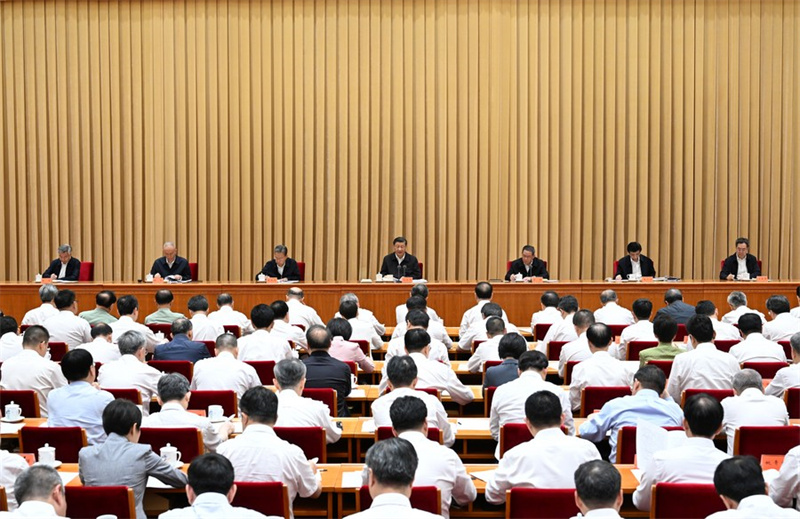Xi stresses building Beautiful China, advancing modernization featuring human-nature harmony
BEIJING, July 18 (Xinhua) -- Chinese President Xi Jinping has stressed efforts to promote the building of a Beautiful China in all respects and accelerate the advancement of modernization featuring harmony between human and nature.
Xi, also general secretary of the Communist Party of China Central Committee and chairman of the Central Military Commission, made the remarks at a national conference on ecological and environmental protection held from Monday to Tuesday.
The next five years is a crucial period for building a Beautiful China, which should be placed in a prominent position in building a great modern socialist country in all respects and advancing national rejuvenation, Xi said.
The country should support high-quality development with a high-quality ecological environment and promote the modernization featuring the harmonious co-existence between human and nature, he noted.
Xi said that the country's ecological conservation has undergone historic, transformative and comprehensive changes both in theory and practice, with significant strides made in building a Beautiful China.
Noting that China's economy and society have entered a stage of high-quality development marked by faster progress in promoting green and low-carbon growth, Xi called for a higher standpoint, a broader perspective and stronger efforts in planning and advancing ecological and environmental protection on the new journey, as well as writing a new chapter of ecological conservation in the new era.

Chinese President Xi Jinping, also general secretary of the Communist Party of China Central Committee and chairman of the Central Military Commission, delivers an important speech at a national conference on ecological and environmental protection in Beijing, capital of China. The conference was held from July 17 to 18 in Beijing. (Xinhua/Rao Aimin)
Xi stressed properly handling the relationships between high-quality development and high-level protection, between tackling major challenges and coordinating governance, between natural recovery and human-assisted restoration, between external constraints and internal driving forces, as well as between "dual carbon" commitments and self-determined actions.
Authorities must remember to maintain human-nature harmony when planning development, Xi said.
High-level environmental protection should be realized to create new driving forces and advantages for development continuously, build a green, low-carbon and circular economy, effectively reduce the resource and environmental costs of development, and increase the potential and sustainability of development, he noted.
While effective measures should be taken to solve the outstanding ecological problems, ecological and environmental protection work should be carried out in a more systematic, holistic, and coordinated manner, Xi said.
The methods of natural recovery and human-assisted restoration should both be adopted in a comprehensive way in accordance with local circumstances, so as to find the best ways for ecological protection and restoration, he said.
He urged efforts to protect the ecological environment with the strictest regulations and laws, and stimulate the internal impetus of the whole society to jointly care for the ecological environment.
In terms of China's commitments and actions on carbon peaking and carbon neutrality, Xi said China's commitments are unswerving, but the path towards the goals as well as the manner, pace and intensity of efforts to achieve them should and must be determined by the country itself, rather than swayed by others.

Chinese President Xi Jinping, also general secretary of the Communist Party of China Central Committee and chairman of the Central Military Commission, delivers an important speech at a national conference on ecological and environmental protection in Beijing, capital of China. The conference was held from July 17 to 18 in Beijing. Li Qiang, Zhao Leji, Wang Huning, Cai Qi, Ding Xuexiang and Li Xi attended the conference. (Xinhua/Rao Aimin)
Efforts should be made to speed up the transformation of development patterns and adhere to green and low-carbon development as the fundamental solution to ecological and environmental problems, Xi said.
He called for enhancing the diversity, stability and sustainability of the ecosystem and intensifying efforts to protect the ecosystem.
Xi also demanded efforts to actively and steadily work toward carbon peaking and carbon neutrality, foster a clean, low-carbon, safe and efficient energy system, accelerate the formation of a new power system and strengthen the country's capability of guaranteeing oil and gas security.
The country should effectively safeguard ecological security, as well as nuclear and radiation safety, and ensure that the natural environment and conditions, which are the foundation of survival and development, are not threatened or damaged, Xi said.
Urging a combination of efforts on legal, market, technological and policy fronts to facilitate the building of a Beautiful China, Xi said support should be strengthened in fiscal and financial areas as well as in tax and pricing policies.
Rights over carbon emissions, energy use, water use and pollution discharge should be allocated in a market-oriented way through reforms, Xi said.
He also called for healthy development of environmental protection industries and related service industries.
Demanding stronger support in science and technology, Xi said all-out efforts should be made to achieve breakthroughs in core technologies in key fields while application of digital technologies including artificial intelligence should be advanced.
Li Qiang presided over the meeting. Zhao Leji, Wang Huning, Cai Qi and Li Xi attended the meeting. Ding Xuexiang made a concluding speech.
Xi's remarks served as guidance and fundamental principles for further enhancing ecological conservation and environmental protection, Li said.
Ding called for resolute efforts to shoulder political responsibilities of building a Beautiful China and advance the modernization featuring human-nature harmony.
(Editor:Wang Su)

